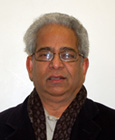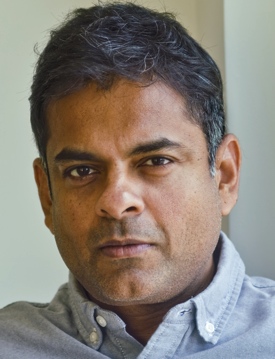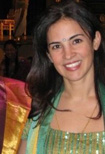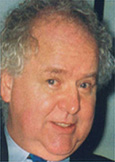15th Annual NEW YORK INDIAN FILM FESTIVAL
May 4 - 9, 2015
JURY MEMBERS
|
| |
 |
 |
 |
 |
 |
| Parag Amladi |
Ashish Avikunthak |
Tejaswini Ganti |
Udayan Gupta |
La Frances Hui |
| |
|
|
|
|
 |
 |
 |
 |
 |
| Poorna Jagannathan |
Joseph Mathew |
Myrna Moncayo-Iyengar |
Claus Mueller |
Muriel (Mike) Peters |
| |
|
|
|
|
 |
 |
 |
|
|
| Dev Benegal |
Zenobia Shroff |
Nilita Vachani |
|
|
|
 Parag Amladi is a film scholar and educator and has taught film studies and film production first in Bombay at the Xavier Institute of Communication and subsequently at campuses of the City University of New York. He is a graduate of the Cinema Studies Dept at the Tisch School of the Arts at New York University. He has published scholarly and journalistic articles on the new Indian cinema as well as on the popular cinema. He has also worked in film and TV production and is currently developing a feature film project. Parag Amladi is a film scholar and educator and has taught film studies and film production first in Bombay at the Xavier Institute of Communication and subsequently at campuses of the City University of New York. He is a graduate of the Cinema Studies Dept at the Tisch School of the Arts at New York University. He has published scholarly and journalistic articles on the new Indian cinema as well as on the popular cinema. He has also worked in film and TV production and is currently developing a feature film project.
|
| |
 Ashish Avikunthak is a filmmaker from India making films for the more than fifteen years. He is an Assistant Professor in Film Media at the University of Rhode Island and has a PhD in Cultural Anthropology from Stanford University. His films have been shown in film festivals and museums worldwide. His first feature film Nirakar Chayya (Shadows Formless) was premiered at the Locarno International Film Festival and won the Best Director and the Best Actress award at NYIFF 2008. Ashish Avikunthak is a filmmaker from India making films for the more than fifteen years. He is an Assistant Professor in Film Media at the University of Rhode Island and has a PhD in Cultural Anthropology from Stanford University. His films have been shown in film festivals and museums worldwide. His first feature film Nirakar Chayya (Shadows Formless) was premiered at the Locarno International Film Festival and won the Best Director and the Best Actress award at NYIFF 2008.
|
| |
 Tejaswini Ganti is an Associate Professor in the Department of Anthropology and its Program in Culture & Media at New York University. A visual anthropologist specializing in South Asia, her research interests include Indian cinema, anthropology of media, production cultures, visual culture, cultural policy, nationalism, neoliberalism, capitalism, ideologies of development and theories of globalization. She has been conducting ethnographic research about the social world and filmmaking practices of the Hindi film industry since 1996 and is the author of Bollywood: A Guidebook to Popular Hindi Cinema (Routledge 2004; 2nd edition forthcoming) Her most recent book Producing Bollywood: Inside the Contemporary Hindi Film Industry (Duke 2012), examines the social and institutional transformations of the Hindi film industry from 1994-2010. She has also written about the politics of commemorative rituals around cinema in Bombay, Hindi filmmakers’ practices of remaking Hollywood films, and the Hindi film industry’s complex relationship to censorship. Additionally, she has produced the documentary, Gimme Somethin’ to Dance to! (1995) which explores the significance of bhangra music for South Asians in the U.S. Tejaswini Ganti is an Associate Professor in the Department of Anthropology and its Program in Culture & Media at New York University. A visual anthropologist specializing in South Asia, her research interests include Indian cinema, anthropology of media, production cultures, visual culture, cultural policy, nationalism, neoliberalism, capitalism, ideologies of development and theories of globalization. She has been conducting ethnographic research about the social world and filmmaking practices of the Hindi film industry since 1996 and is the author of Bollywood: A Guidebook to Popular Hindi Cinema (Routledge 2004; 2nd edition forthcoming) Her most recent book Producing Bollywood: Inside the Contemporary Hindi Film Industry (Duke 2012), examines the social and institutional transformations of the Hindi film industry from 1994-2010. She has also written about the politics of commemorative rituals around cinema in Bombay, Hindi filmmakers’ practices of remaking Hollywood films, and the Hindi film industry’s complex relationship to censorship. Additionally, she has produced the documentary, Gimme Somethin’ to Dance to! (1995) which explores the significance of bhangra music for South Asians in the U.S.
Education: BA 1991, Northwestern University; MA 1994, University of Pennsylvania; PhD 2000, New York University.
|
| |
 Udayan Gupta is the co-founder of Books Beyond Boundaries, a collaborative publishing company, and a consultant to small entrepreneurial businesses and asset managers. Udayan Gupta is the co-founder of Books Beyond Boundaries, a collaborative publishing company, and a consultant to small entrepreneurial businesses and asset managers.
He is a former senior special writer at The Wall Street Journal, is the author of several books, including Done Deals, The First Venture Capitalist and Mind Into Matter. Mr. Gupta’s writings have appeared in The Wall Street Journal, The New York Times as well as Advertising Age, Alpha, American Film, Barron’s, Black Enterprise, Chronicle of Higher Education, Cineaste, Electronic Media, Fortune, Hispanic Business, Information Week, Institutional Investor, Jump Cut, Madison Avenue, Red Herring, and Seven Days. He is also a publisher and producer of interactive multi-media projects.
|
| |
 La Frances Hui is the Film Curator of Asia Society New York, where she directs its year-round film program. She has also curated for Film Southasia (Kathmandu) and the Asian American International Film Festival (New York). Film series she has curated include independent and classic Chinese films, New Wave Japanese, contemporary Thai and Iranian cinemas; as well as director retrospectives featuring Tsai Ming-Liang, Jafar Panahi, and Pema Tseden. Hui regularly leads on-stage conversations with major film artists including Jia Zhangke, Ang Lee, Apichatpong Weerasethakul, Pen-ek Ratanaruang, John Woo, Luc Besson, and Sharmeen Obaid-Chinoy. Her writings on film have been published by Cinevue (Asian CineVision), ChinaFile.com, and The Margins (Asian American Writers’ Workshop). She was a committee member of the Margaret Mead Film Festival and a jury member of the South Asian International Film Festival. Hui has spoken at Film Southasia of Kathmandu, New York University, Queens College (CUNY), Stony Brook University, Taipei National University of the Arts, China Institute, and CUNY-TV. La Frances Hui is the Film Curator of Asia Society New York, where she directs its year-round film program. She has also curated for Film Southasia (Kathmandu) and the Asian American International Film Festival (New York). Film series she has curated include independent and classic Chinese films, New Wave Japanese, contemporary Thai and Iranian cinemas; as well as director retrospectives featuring Tsai Ming-Liang, Jafar Panahi, and Pema Tseden. Hui regularly leads on-stage conversations with major film artists including Jia Zhangke, Ang Lee, Apichatpong Weerasethakul, Pen-ek Ratanaruang, John Woo, Luc Besson, and Sharmeen Obaid-Chinoy. Her writings on film have been published by Cinevue (Asian CineVision), ChinaFile.com, and The Margins (Asian American Writers’ Workshop). She was a committee member of the Margaret Mead Film Festival and a jury member of the South Asian International Film Festival. Hui has spoken at Film Southasia of Kathmandu, New York University, Queens College (CUNY), Stony Brook University, Taipei National University of the Arts, China Institute, and CUNY-TV. |
| |
 Poorna Jagannathan is an award-winning actress and has worked extensively in theatre, film and TV in India and in the US. She is best known to audiences for her movie with Aamir Khan, Delhi Belly, for which she won a Stardust and a L’oreal Femina Award for best supporting actress in 2012. In 2013, NIRBHAYA , the play she initiated, produced and acted in, won the Scotsman Fringe First Award, The Angel Herald Award and The Amnesty International Freedom of Expression Award at the Edinburgh Fringe Festival. Ms. Jagannathan is a series regular on HBO’s new show, Crime . Some film credits include Thanks for Sharing by Stuart Blumberg and Yeh Jawaani Hai Deewani by Ayan Mukerji. TV credits include House of Cards, Royal Pains, Law & Order and Rescue Me. She also recently produced an India tour of Martin Moran's award-winning plays The Tricky Part and All the Rage . The tour sought to raise awareness of the much silenced epidemic of sexual violence among boys in India. Ms. Jagannathan is part of The Barrow Group in NYC and a brand ambassador for PETA. She was born in Tunisia and grew up in Ireland, Pakistan, Brazil, Argentina and America. She has a degree in Journalism and Women’s Studies from the University of Maryland. She currently lives between Mumbai and New York City. Poorna Jagannathan is an award-winning actress and has worked extensively in theatre, film and TV in India and in the US. She is best known to audiences for her movie with Aamir Khan, Delhi Belly, for which she won a Stardust and a L’oreal Femina Award for best supporting actress in 2012. In 2013, NIRBHAYA , the play she initiated, produced and acted in, won the Scotsman Fringe First Award, The Angel Herald Award and The Amnesty International Freedom of Expression Award at the Edinburgh Fringe Festival. Ms. Jagannathan is a series regular on HBO’s new show, Crime . Some film credits include Thanks for Sharing by Stuart Blumberg and Yeh Jawaani Hai Deewani by Ayan Mukerji. TV credits include House of Cards, Royal Pains, Law & Order and Rescue Me. She also recently produced an India tour of Martin Moran's award-winning plays The Tricky Part and All the Rage . The tour sought to raise awareness of the much silenced epidemic of sexual violence among boys in India. Ms. Jagannathan is part of The Barrow Group in NYC and a brand ambassador for PETA. She was born in Tunisia and grew up in Ireland, Pakistan, Brazil, Argentina and America. She has a degree in Journalism and Women’s Studies from the University of Maryland. She currently lives between Mumbai and New York City.
|
| |
 Joseph Mathew is an award-winning filmmaker based in New York City. His documentary Crossing Arizona premiered at the Sundance Film Festival in 2006 and has been widely distributed around the world. His first narrative film, Bombay Summer won three awards including Best Director and Best Film at the MIAAC film festival 2009. Joseph Mathew is an award-winning filmmaker based in New York City. His documentary Crossing Arizona premiered at the Sundance Film Festival in 2006 and has been widely distributed around the world. His first narrative film, Bombay Summer won three awards including Best Director and Best Film at the MIAAC film festival 2009. |
| |
 Myrna Moncayo-Iyengar currently works as Director of Corporate Strategy for Tribeca Enterprises, the parent company of the Tribeca Film Festival, Tribeca Film and Tribeca Flashpoint. Prior to Tribeca, Myrna led the casting process for Ramin Bahrani's film Chop Shop, which premiered at the 2007 Cannes Film Festival and was nominated for two Independent Spirit Awards and one Gotham Award, including Breakthrough Actor. She also helped coordinate Oscar-campaign events for "Children of Men" and "Pan's Labyrinth" while at Alfonso Cuarón's Esperanto Filmoj, and managed film acquisitions for Emerging Pictures. Prior to being bitten by the film bug in 2005, she worked in various management positions for 10 years in various firms including Citibank, Deloitte & Touche and KPMG. Myrna Moncayo-Iyengar currently works as Director of Corporate Strategy for Tribeca Enterprises, the parent company of the Tribeca Film Festival, Tribeca Film and Tribeca Flashpoint. Prior to Tribeca, Myrna led the casting process for Ramin Bahrani's film Chop Shop, which premiered at the 2007 Cannes Film Festival and was nominated for two Independent Spirit Awards and one Gotham Award, including Breakthrough Actor. She also helped coordinate Oscar-campaign events for "Children of Men" and "Pan's Labyrinth" while at Alfonso Cuarón's Esperanto Filmoj, and managed film acquisitions for Emerging Pictures. Prior to being bitten by the film bug in 2005, she worked in various management positions for 10 years in various firms including Citibank, Deloitte & Touche and KPMG.
|
| |
 Claus Mueller pursued undergraduate and graduate studies in Germany, France, and the United States and teaches media research at CUNY. He has authored books and articles, focusing most recently integration and film tourism issues, as well as producing DOCUMENTARIES and presented related papers in New Delhi, Busan and other venues. As a recipient of numerous awards, including Fulbrights, he has arranged seminars and Congressional briefings and carried out research overseas with the next project scheduled for Cambodia. Apart from curating at specialized film festivals he has served as a judge for film festivals and for the national and international Emmys. He is the New York Correspondent for the Paris based M21Editions, but also writes for other electronic and print publications. He has been serving on the board of non-profit media organizations such as the International Film Exchange and the New York Film and Video Council and has been elected to the American Council on Germany and the International Council of the National Television Academy. He is listed in Marquis’ Who’s Who in America. Claus Mueller pursued undergraduate and graduate studies in Germany, France, and the United States and teaches media research at CUNY. He has authored books and articles, focusing most recently integration and film tourism issues, as well as producing DOCUMENTARIES and presented related papers in New Delhi, Busan and other venues. As a recipient of numerous awards, including Fulbrights, he has arranged seminars and Congressional briefings and carried out research overseas with the next project scheduled for Cambodia. Apart from curating at specialized film festivals he has served as a judge for film festivals and for the national and international Emmys. He is the New York Correspondent for the Paris based M21Editions, but also writes for other electronic and print publications. He has been serving on the board of non-profit media organizations such as the International Film Exchange and the New York Film and Video Council and has been elected to the American Council on Germany and the International Council of the National Television Academy. He is listed in Marquis’ Who’s Who in America.
|
| |
 Muriel (Mike) Peters film and television productions and credits include: LISTENING TO VOLCANOES, a Documentary shot in Indonesia for PBS and BBC, with Madhur Jaffrey as presenter; INNER SPACE TO OUTER SPACE, a trilogy of films on Indonesia; ASIA STAGE CENTER, a television series bringing together Asian and Western performing artists; THE REVENGE OF TWO SONS, a video on the Court Dance of Okinawa; MANIFESTATIONS OF SHIVA, a Documentary feature for the Philadelphia Museum of Art, the Asia Society and PBS; WHAT DO YOU WANT TO DO WHEN YOU GROW OLD? With DCA Productions; THE EYE OF THE STORM, a Documentary for ABC News, winner of a Peabody and many other awards; THE DAY BEFORE TOMORROW, for Newsweek Magazine; THE GURU, a Merchant Ivory feature shot in India for 20th Century Fox, starring Michael York and Utpal Dutt; and AFRICA, a four-hour Documentary for ABC. She is currently one of the producers of the Documentary film, A WAY HOME, about the U.S.-Manipur baseball project; and is developing THE DIPLOMAT’S WIFE, a feature set in India in 1963. Muriel (Mike) Peters film and television productions and credits include: LISTENING TO VOLCANOES, a Documentary shot in Indonesia for PBS and BBC, with Madhur Jaffrey as presenter; INNER SPACE TO OUTER SPACE, a trilogy of films on Indonesia; ASIA STAGE CENTER, a television series bringing together Asian and Western performing artists; THE REVENGE OF TWO SONS, a video on the Court Dance of Okinawa; MANIFESTATIONS OF SHIVA, a Documentary feature for the Philadelphia Museum of Art, the Asia Society and PBS; WHAT DO YOU WANT TO DO WHEN YOU GROW OLD? With DCA Productions; THE EYE OF THE STORM, a Documentary for ABC News, winner of a Peabody and many other awards; THE DAY BEFORE TOMORROW, for Newsweek Magazine; THE GURU, a Merchant Ivory feature shot in India for 20th Century Fox, starring Michael York and Utpal Dutt; and AFRICA, a four-hour Documentary for ABC. She is currently one of the producers of the Documentary film, A WAY HOME, about the U.S.-Manipur baseball project; and is developing THE DIPLOMAT’S WIFE, a feature set in India in 1963.
Ms. Peters was Director of the Film and Broadcasting Department of the Asia Society in New York from 1977-82, during which time she was Director of FILM INDIA (a major retrospective of films from India, jointly with MOMA), of FILMS FROM KOREA and of CINEMA INDONESIA. She was also Executive in charge of Film and Broadcasting for the Indo-US Subcommission on Education and Culture from 1976-83.
She is a longtime member of New York Women in Film, served as a Board Director and continues to serve on the Advisory Board. She was for some years the Chairman of the Board of Women in Film and Television International. She is a member of IFP.
Ms. Peters received a B.A. in philosophy from Harvard University, and a B. Litt in Oriental Art from Oxford University. Her dissertation was on the Elephanta caves of India, where she also lived for many years. She continues to maintain close ties with India. She has traveled widely in Asia, the Middle East, Europe, the Caribbean, North America.
|
| |
 Dev Benegal is considered the pioneer of the next generation of Indian cinema, and his first feature film English, August is acknowledged as a landmark film in contemporary Indian cinema. It won the National Film Award for Best Feature Film in English, three major international awards and became the first Indian film to be acquired for distribution by 20th Century Fox. His second feature, “Split Wide Open” (1999), premiered at the Venice International Film Festival. Both films were distributed by 20th Century Fox and played at more than 30 international festivals worldwide. His feature film script, “Road, Movie”, was selected for the prestigious Atelier du Cannes at the Cannes International Film Festival. Produced, by Ross Katz (“Lost in Translation”) and Susan B. Landau (“An Ideal Husband”), it was the first Hindi language film to be distributed worldwide by Fortissimo Films (2010) and was one of the first features to be distributed in the US by Tribeca Films. The film premiered at Toronto and was the Opening Night film at the Generation Plus section at the Berlin International Film Festival, His screenplay for his next film "Dead, End or: How I Learnt to Stop Living and Love Being Officially Dead" won the Grand Prix at the NAFF / PIFAN Film Festival in Korea. He is currently working on his new movie, BOMBAY SAMURAI, Dev is on the Advisory Council of Time Warner - Asia Society’s New Voices Fellowship for Screenwriters. Dev Benegal is considered the pioneer of the next generation of Indian cinema, and his first feature film English, August is acknowledged as a landmark film in contemporary Indian cinema. It won the National Film Award for Best Feature Film in English, three major international awards and became the first Indian film to be acquired for distribution by 20th Century Fox. His second feature, “Split Wide Open” (1999), premiered at the Venice International Film Festival. Both films were distributed by 20th Century Fox and played at more than 30 international festivals worldwide. His feature film script, “Road, Movie”, was selected for the prestigious Atelier du Cannes at the Cannes International Film Festival. Produced, by Ross Katz (“Lost in Translation”) and Susan B. Landau (“An Ideal Husband”), it was the first Hindi language film to be distributed worldwide by Fortissimo Films (2010) and was one of the first features to be distributed in the US by Tribeca Films. The film premiered at Toronto and was the Opening Night film at the Generation Plus section at the Berlin International Film Festival, His screenplay for his next film "Dead, End or: How I Learnt to Stop Living and Love Being Officially Dead" won the Grand Prix at the NAFF / PIFAN Film Festival in Korea. He is currently working on his new movie, BOMBAY SAMURAI, Dev is on the Advisory Council of Time Warner - Asia Society’s New Voices Fellowship for Screenwriters. |
| |
 Zenobia Shroff - Zenobia Shroff has been a actress, writer and teaching artist for twenty five years. She began her professional career at age sixteen as a commercial print model. After seven successful years as a model she switched gears to acting. She got her acting start in Mumbai under the mentorship of the legendary Pearl Padamsee. With Padamsee’s encouragement, she came to study acting at New York’s Circle in the Square theatre school. Soon after, she honed her craft at the off- Broadway theatre Castillo, where she played several and diverse roles such as Nora in Ibsen’s ‘A Doll’s house’ to German avant-gardist Heiner Muller. She also performed in Mario Frattis “Erotic adventures in Venice” at the famed La Mama and Milan Kunderas “Jacques and his master”. Zenobia Shroff - Zenobia Shroff has been a actress, writer and teaching artist for twenty five years. She began her professional career at age sixteen as a commercial print model. After seven successful years as a model she switched gears to acting. She got her acting start in Mumbai under the mentorship of the legendary Pearl Padamsee. With Padamsee’s encouragement, she came to study acting at New York’s Circle in the Square theatre school. Soon after, she honed her craft at the off- Broadway theatre Castillo, where she played several and diverse roles such as Nora in Ibsen’s ‘A Doll’s house’ to German avant-gardist Heiner Muller. She also performed in Mario Frattis “Erotic adventures in Venice” at the famed La Mama and Milan Kunderas “Jacques and his master”.
|
| |
 Nilita Vachani was born in New Delhi and now lives in New York. She is an internationally acclaimed documentary filmmaker and writer. Her film Eyes of Stone won the Golden Conch at BIFF (1992) and the Rajat Kamal for the Best Film on Social Issues the same year; the Prix Alcan du Jury at the Montreal International Festival of Films by Women (1990), the Uppsala FilmKaja at the Uppsala International Film Festival (1991), the Basil Wright Prize at the Royal Anthropological Institute Film Festival, Manchester (1992), special mention Prix des Bibliotheque, Cinema du Reel (1990) and a nomination for the Documentary award at Hawaii, 1992. Her film Diamonds in a Vegetable Market won BBC the best Feature Documentary award from the Asian Film Academy in 1994. ‘When Mother Comes Home for Christmas won the Best Film at the Festival dei Popoli in Florence (1996) and Best Documentary at the International Women’s film festival in Torino (1997). Her films have been in the official selections at Berlin, Rotterdam, London, New York, Toronto, San Francisco, Hong Kong, Yamagata, amongst a host of others, and have been broadcast on BBC, La Sept, Arte, ORF, SBS, ZDF. ERT, RAI and Doordarshan. Apart from being extensively reviewed in the media, her work has been written about in Global Woman (Ehrenreich and Hochschild, 2003), Left in the Dark (Stuart Klawans, 2002) and Moving People Moving Images (Brown et al,2010). Nilita Vachani was born in New Delhi and now lives in New York. She is an internationally acclaimed documentary filmmaker and writer. Her film Eyes of Stone won the Golden Conch at BIFF (1992) and the Rajat Kamal for the Best Film on Social Issues the same year; the Prix Alcan du Jury at the Montreal International Festival of Films by Women (1990), the Uppsala FilmKaja at the Uppsala International Film Festival (1991), the Basil Wright Prize at the Royal Anthropological Institute Film Festival, Manchester (1992), special mention Prix des Bibliotheque, Cinema du Reel (1990) and a nomination for the Documentary award at Hawaii, 1992. Her film Diamonds in a Vegetable Market won BBC the best Feature Documentary award from the Asian Film Academy in 1994. ‘When Mother Comes Home for Christmas won the Best Film at the Festival dei Popoli in Florence (1996) and Best Documentary at the International Women’s film festival in Torino (1997). Her films have been in the official selections at Berlin, Rotterdam, London, New York, Toronto, San Francisco, Hong Kong, Yamagata, amongst a host of others, and have been broadcast on BBC, La Sept, Arte, ORF, SBS, ZDF. ERT, RAI and Doordarshan. Apart from being extensively reviewed in the media, her work has been written about in Global Woman (Ehrenreich and Hochschild, 2003), Left in the Dark (Stuart Klawans, 2002) and Moving People Moving Images (Brown et al,2010).
Nilita has worked as an Editor on several documentary features and as Assistant Director on Mira Nair’s ‘Salaam Bombay’ and Script Supervisor on ‘Mississippi Masala’.
Her debut novel HomeSpun won Foreword’s Choice Fiction Award in 2008. Nilita has recently adapted Amitav Ghosh’s novel The Hungry Tide for the screen. Her first screenplay The Banyan won the French government’s CNC-Fonds-Sud prize for an emerging filmmaker from the south.
She is Associate faculty at Tisch School for the Arts, New York University.
|
| |
|
| |
|
|
|
|

